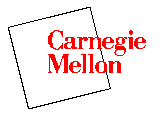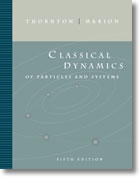 |
Physics 33-332
Physical Mechanics II
Spring 2004
|
Meeting Times and Places
| Lectures: |
MWF |
1:30pm to 2:20pm |
WEH 7316 |
| Recitations: |
W |
8:30am to 9:20am |
DH 1212 |
Instructor
- Prof. C. Morningstar
|
Course complete.
|
Course Overview
Physical Mechanics II is the second course in a two-semester
sequence on advanced classical mechanics for physics majors. The course
will begin with a review of coordinate systems, frames of reference,
Newton's laws, and the concepts of energy, momentum, and angular momentum.
Motion in noninertial reference frames and perturbation theory will then be
studied, followed by the dynamics of rigid bodies, coupled oscillations,
and nonlinear oscillations and chaos. Time permitting, Hamiltonian
dynamics will be introduced.
As in the first semester, this course is a quantitative one and will
require the use of advanced mathematics to solve more difficult
physical problems.
Students will be graded based on three mid-term tests,
six homework assignments, recitation attendance and performance,
and a comprehensive final exam.
Prerequisites
- 33-331 Physical Mechanics I (and its prerequisites)
Text Book
- Jerry B. Marion and Stephen T. Thorton,
-
Classical Dynamics of Particles and Systems
- Fifth Edition (Harcourt)
(available at the book store -- fourth edition is still okay)
Office Hours
- Any time my door is open.
- Questions submitted via email are welcome at any time.
Other recommended texts
- John R. Taylor,
Classical Mechanics,
Pre-Publication Edition (University Science)
- D.G. Ivey and J.N.P. Hume,
Physics, Volume 1
(Wiley & Sons)
- H. Goldstein,
Classical Mechanics,
Second Edition (Addison-Wesley)
P.A. Tipler,
Physics for scientists and engineers,
Volume 1 Fourth Edition (Freeman)
|
 |
Course outline
Syllabus
(Portable Document Format)
(Postscript Format)
Grader
Hee Kyoung Ko
Assignments, solutions, and hand-outs are available on this web site
usually in either Portable Document Format (PDF) or in Postscript (PS)
format. To view PDF files, you will need the freely-available
Adobe Acrobat Reader which can be installed as a plug-in
or helper application for your browser. To view Postscript file, you
will need the freely-available
GSview and Ghostscript.
HyperPhysics Intro
HyperPhysics Mechanics
How Things Work
How Stuff Works
Mathematics Assistance
The Particle Adventure
Department of Physics Homepage


